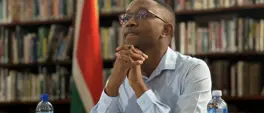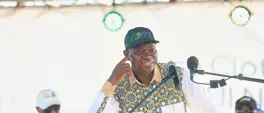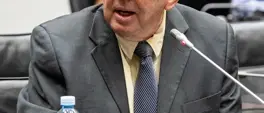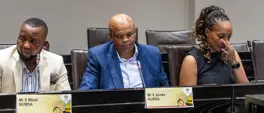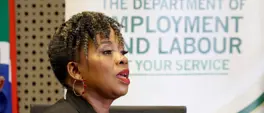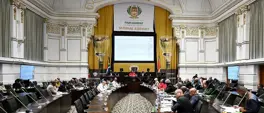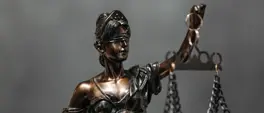CHRIS OXTOBY & JUDITH FEBRUARY | JSC interviews – Showing a challenging road ahead?
Judith February
17 October 2025 | 12:42"These appointments are desperately needed at a Court struggling to deal with its ever-increasing workload and to hopefully add intellectual heft to the country’s highest court."
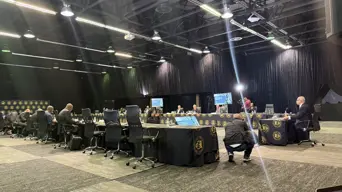
FILE: The Judicial Service Commission interviews a candidate to fill vacancies on the Labour Court and Electoral Court benches on 1 April 2025. Picture: Kgomotso Modise/EWN
The Judicial Service Commission (JSC) has just wrapped up a lengthy sitting which, as is often the case, illustrates many of the significant challenges that face the South African judiciary.
Starting on the 7th of October, the JSC interviewed candidates to fill positions on the Constitutional Cour, Supreme Court of Appeal (SCA), Labour Court, and several positions on the High Court.
The JSC is central to the process of appointing judges – it makes binding recommendations for appointments to all the superior courts below the Constitutional Court and compiles a list of suitable candidates from which the President makes appointments to the Constitutional Court.
Hence, the JSC’s public process rightly attracts scrutiny, considering the crucial role judges play in upholding the rule of law in our constitutional democracy.
Several significant aspects of this round of interviews can be highlighted.
The Constitutional Court has had two vacancies open for four years, which has been of great concern. This time the JSC was able to compile a list of candidates for the President to make appointments to fill both vacancies.
These appointments are desperately needed at a Court struggling to deal with its ever-increasing workload and to hopefully add intellectual heft to the country’s highest court.
However, the Constitutional Court interviews raised questions about the shortlisting process. Prior to the interviews, Freedom Under Law highlighted how serious reservations had been raised about one of the candidates, Dr Madumetja Malepe, ranging from the candidate being under debt review to a lack of any kind of judicial track record for the JSC to assess.
The interview proved that these concerns were well-founded, and whilst Dr Malepe was not included on the list from which the appointments will be made, it is hard to see how she was shortlisted to begin with – particularly since none of the JSC’s commissioners made any attempt to support her candidacy during the interview.
The shortlisting process clearly needs attention from the JSC. Other interviews demonstrated that the issue was not limited to the Constitutional Court.
Indeed, the JSCcancelled interviews for vacancies on the Eastern Cape High Court “owing to issues relating to the shortlisting of candidates”, and some candidates for the Mpumalanga High Court were met with scepticism for not having served as acting judges in that court – again raising the question of why they would be shortlisted in the first place.
All the above bears out the argument in Freedom Under Law’s 2022 research paper on the JSC that the shortlisting process needs consistency and transparency. This shortcoming should be addressed by the JSC for future sessions.
For the SCA, there was also a pressing need for a vacancy to be filled. There has been significant loss of experienced judges from the Bloemfontein-based court over recent years due to promotions and retirements. With six candidates competing for a single vacancy, it was expected that the vacancy would be filled, and at least three of the candidates (judges Bloem, Norman and Windell) seemed to impress the JSC sufficiently to warrant their appointment. And yet, the JSC was unable to recommend an appointment.
This raises further questions about the JSC’s deliberation and voting process, which is already the subject of ongoing litigation brought by FUL following the JSC’s incomprehensible failure to fill the full set of vacancies before them in October 2023.
In this litigation, FUL seeks a ruling, inter alia, that JSC be required to develop assessment criteria for how it selects candidates, and that commissioners be required to give candidates written scores to ensure compliance with the assessment criteria.
The vacancy for Deputy Judge President of the Eastern Cape High Court was also not filled, although these interviews were more notable for the broader concerns they illustrated about the current state of the judiciary and the challenges the courts are facing.
The interviews laid bare issues facing the courts in the province, particularly the apparent dysfunction in the Mthatha High Court (reports earlier this year made serious allegations of bribery and corruption against administrative officials at the court).
Several JSC commissioners expressed pointed reservations how the candidates, all long serving judges in the division, had performed in that environment.
Finally, several interviews across the two-week sitting raise uncomfortable questions about whether the pool of candidates from which the JSC must select judges is as strong as it should be.
There were numerous instances where commissioners were clearly unpersuaded that candidates had the technical qualities required for the job, and just as alarmingly, questions were raised about the ethical suitability of some candidates.
One candidate, for example, withdrew his candidacy during the interview following questions about his suspension from legal practice, and how he had disclosed the issue to the JSC.
To the JSC’s credit, it must be said that the current commission is as rigorous in scrutinising candidates’ track records as at any time in last 15 years.
It is unwise for candidates to be vague or evasive in either their application papers or in the interview itself
But whilst this scrutiny is commendable in helping to protect the judiciary from highly problematic appointments, there will be a significant challenge for the judiciary if the pool of candidates from which the JSC must select continues to underwhelm. Concerns about the standard of candidates have been raised before in recent years, and in observing the interviews the concern is an ongoing one.
This has serious consequences for the future of the rule of law in our country and is a challenge that must be met head-on. The courts need the best and the brightest lawyers to aspire to and apply for, judicial office.
The reasons for the dearth of appropriate candidates are various.
If it is so that the way the JSC has treated candidates in the past, through unpredictable and sometimes hostile treatment, is continuing to deter good candidates (a prospect FUL has raised previously),then it will be important for the JSC to continue to show development and improvement of its processes in order to rebuild the confidence of the profession and indeed, the bench.
The leadership of the Chief Justice will be crucial in his regard. Chief Justice Maya’s appointment was hailed at the time most notably for the fact that she is the first woman in South Africa to hold this position.
This is an indicator of progress as regards gender equality but, while the symbolism of a woman heading the judiciary is important, far more important will be how the Chief Justice deals with the thorny issues facing the judiciary. Globally and locally the judiciary is facing headwinds as it is often the last check on untrammelled power, particularly political power.
Safeguarding the independence of the judiciary is thus key but the Chief Justice will also need to take the lead in attempts to find pragmatic solutions to deal with the backlogs facing our courts and being clear-eyed about the role of the JSC. All this will require not only astute and thoughtful leadership but attention to the detail of fixing some of the challenges outlined above.
There are no quick fixes, however. Much attention during these interviews was focused on questions of briefing patterns and ongoing exclusion in the legal profession, and what candidates had done to address those issues. Without downplaying the importance of these questions, we must ask what more is needed to fulfil the role of a judge?
The transformation of the judiciary remains a central issue to the appointments process, as these interviews illustrated. As FUL argues in its 2022 report on the JSC, assessing a candidate from a transformation perspective requires evaluating “a candidate’s firm and demonstrable commitment to the transformative constitutional project and its underlying values”.
The best candidates, and the ones that need to be putting themselves forward, need to show these qualities, as well as the technical skills and independent mindedness to cope with the crippling workload and political pressures our courts are increasingly subjected to. The JSC has its work cut out for it to ensure that candidates with these attributes have the confidence in the appointment process to put themselves forward.
Get the whole picture 💡
Take a look at the topic timeline for all related articles.
